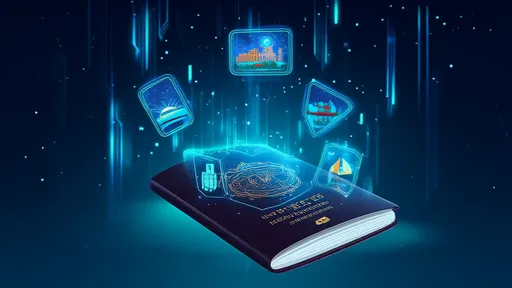The travel industry is undergoing a quiet revolution, one blockchain-verified stamp at a time. Forget the dog-eared paper passports stuffed with fading immigration stickers – a new generation of travelers is collecting digital footprint badges authenticated by NFT technology. These blockchain-secured travel credentials aren't just novelty items; they're rewriting how we document our journeys while creating unprecedented opportunities for creators, destinations, and explorers alike.
At the heart of this movement lies an elegant solution to a very modern problem: in an era where our lives migrate increasingly online, how do we tangibly preserve our physical adventures? Traditional passport stamps have charm but lack durability and verifiability. Social media posts vanish in algorithmic feeds. NFT travel badges solve both issues by creating immutable, ownable records of where we've been and what we've experienced.
The mechanics are simpler than the technology behind them. When a traveler visits a participating location – whether it's a national park, museum, or local café – they can acquire a unique digital badge. This isn't merely a JPEG; it's a smart contract on the blockchain recording precise details about when and where the badge was earned. Some versions incorporate GPS verification or QR code scans to prevent fraudulent claims, while others partner with existing travel platforms to automatically log check-ins.
What makes these digital collectibles compelling goes beyond their technological novelty. For destinations, they represent a powerful marketing tool. A limited-edition badge released for a festival or seasonal attraction creates buzz while providing analytics about visitor demographics. Museums have experimented with tiered badges – common ones for general admission, rare variants for special exhibitions, and ultra-exclusive versions for behind-the-scenes tours.
The collector psychology at play mirrors traditional passport stamps but with added dimensions. Just as some travelers once schemed to visit obscure border crossings for unique stamps, digital badge hunters now plot itineraries to complete themed collections. Foodies might pursue culinary trails where each Michelin-starred meal unlocks a corresponding badge. Adventure seekers could chase badges tied to extreme activities or remote locations. The blockchain layer introduces provable scarcity – no one can counterfeit that badge proving you were among the first hundred visitors to a newly opened archaeological site.
Creators are finding unexpected opportunities in this space. Digital artists collaborate with tourism boards to design visually striking badge series. Writers attach micro-stories or poems to location-specific NFTs. Musicians create exclusive tracks accessible only to badge holders. This transforms travel memorabilia from passive souvenirs into active cultural exchanges and patronage systems.
Privacy considerations have shaped how these systems develop. Unlike social media check-ins that often broadcast real-time location data, blockchain badges can be designed to reveal only what the holder chooses. Some implementations use zero-knowledge proofs to verify badge ownership without exposing personal details. This appeals to travelers who want to document their journeys without compromising security.
The environmental impact of blockchain technology remains a concern that projects address in various ways. Many travel NFT platforms have migrated to energy-efficient proof-of-stake networks. Others incorporate carbon offset mechanisms, automatically contributing a portion of each badge's proceeds to environmental causes. Some even offer special badges for travelers who participate in eco-friendly tourism activities.
Looking ahead, the potential integrations are fascinating. Imagine universities recognizing study abroad experiences through verifiable badge transcripts. Picture visa applications where blockchain travel history provides authenticated proof of previous destinations. Envision loyalty programs where badges unlock tiered benefits across hotel chains and airlines. The infrastructure being built today could support these applications sooner than we expect.
Already, early adopters are seeing their digital travel collections appreciate in unexpected ways. Rare badges from temporary installations or disaster-affected locations (like Hawaii's Lahaina before the wildfires) have become historically significant digital artifacts. Some travelers have leveraged their collections for freelance opportunities, proving their global experience to potential clients. Others simply treasure the ability to revisit their journey through a verifiable, unhackable digital scrapbook.
As with any emerging technology, challenges persist. The fragmentation between competing badge platforms creates confusion. Mainstream adoption requires solving usability barriers for non-crypto-native travelers. And the emotional resonance of physical stamps won't disappear overnight. Yet the trajectory is clear – just as photography changed how we remember trips and social media altered how we share them, blockchain verification is transforming how we own our travel histories.
The next time you pass through immigration, consider that the stamp in your passport might one day be a quaint relic. The future of travel documentation is being written in blockchain transactions and digital collectibles – each one a permanent, tradeable, and beautiful testament to where your feet have taken you.

By /Jul 16, 2025

By /Jul 16, 2025

By /Jul 16, 2025

By /Jul 16, 2025

By /Jul 16, 2025

By /Jul 16, 2025

By /Jul 16, 2025

By /Jul 16, 2025

By /Jul 16, 2025

By /Jul 16, 2025

By /Jul 16, 2025

By /Jul 16, 2025

By /Jul 16, 2025

By /Jul 16, 2025

By /Jul 16, 2025

By /Jul 16, 2025

By /Jul 16, 2025

By /Jul 16, 2025